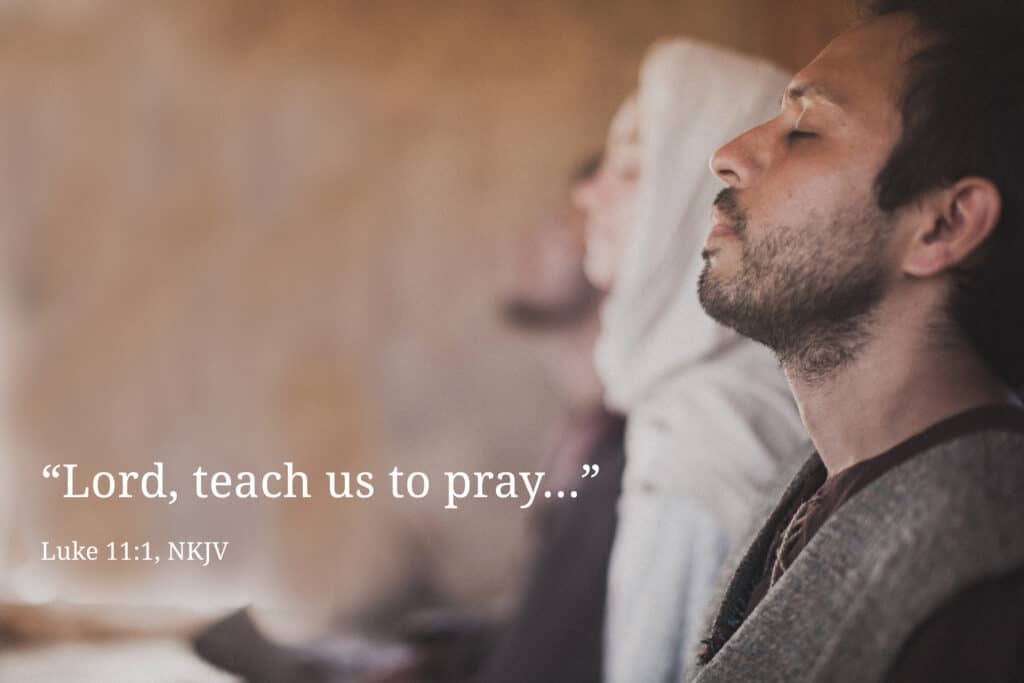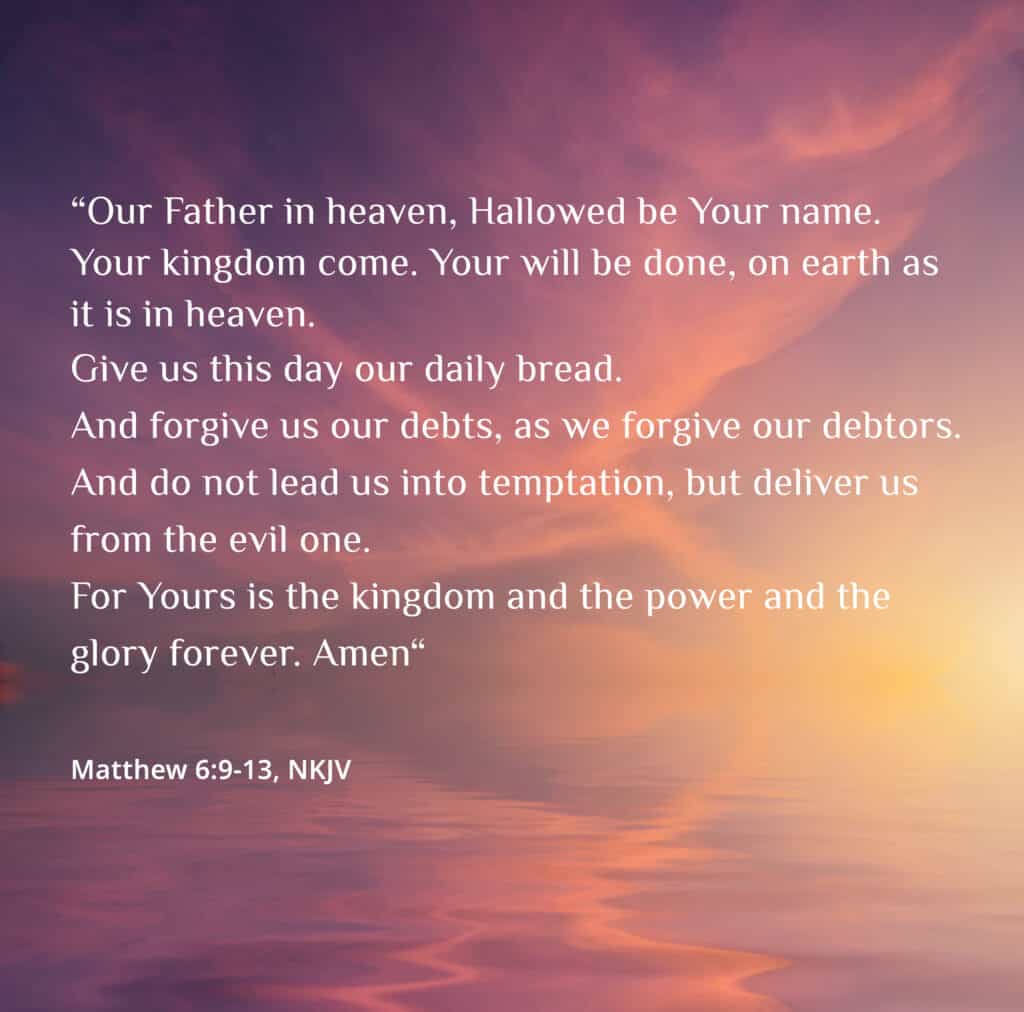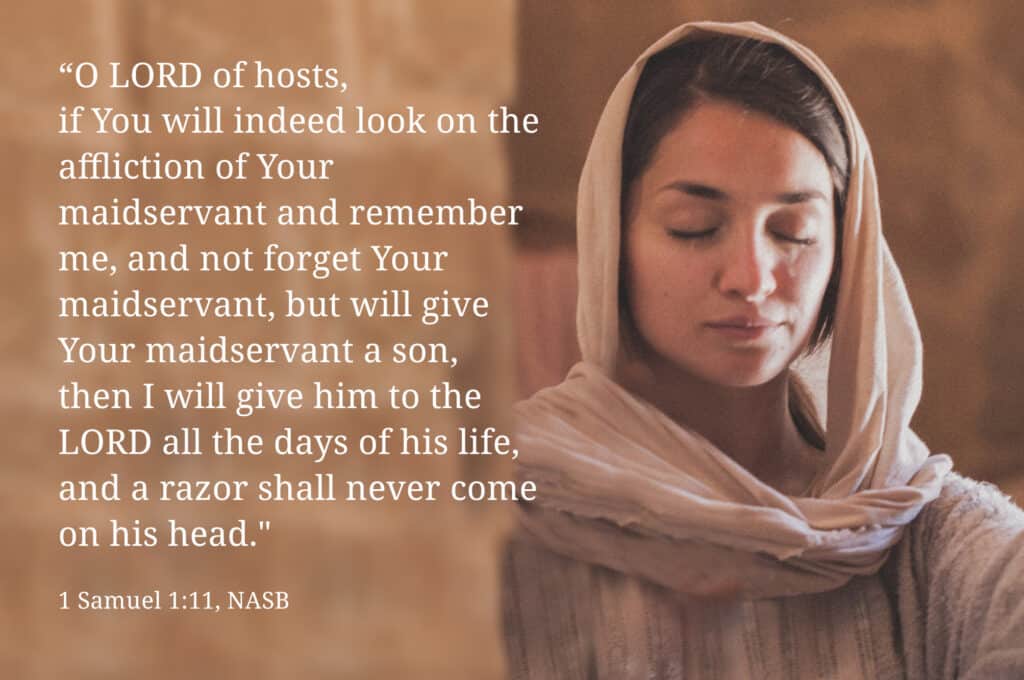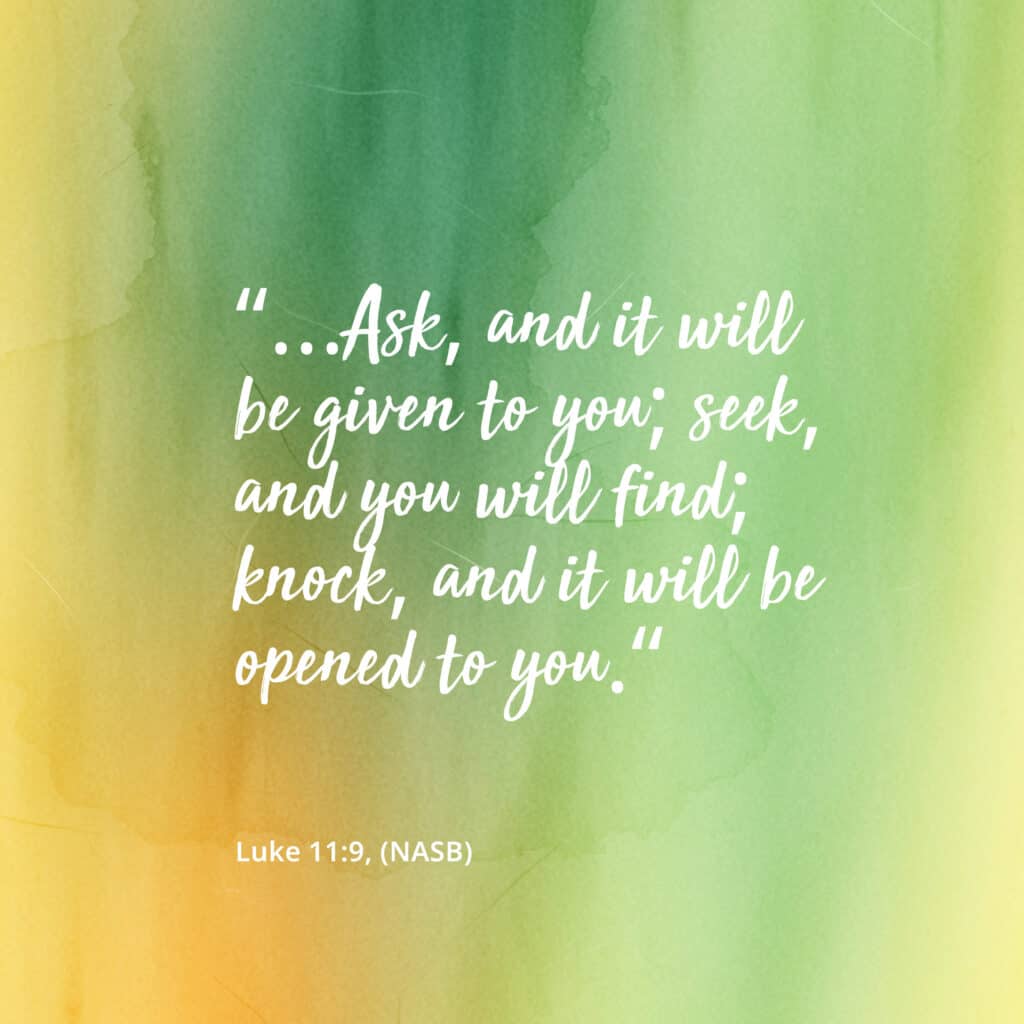Whether you’re just starting to include prayer in your life, or you’re simply wanting to enrich your prayer life, the best place to look for guidance is Scripture.
In the Bible we find numerous records of passionate prayers. By reading these prayers we can learn—from people who were just like us—different ways to pray to our Creator. We can also see what the power of prayer can do when it becomes a regular part of our lives.
But the Bible’s a big book. Where’s the best place to start when looking for stories and examples of sincere prayer?
We’ll go over:
- The significance of prayer in the Bible
- Popular prayers in the Bible
- Answers to prayers in the Bible
Let’s start by looking at what the Bible says about prayer, then we’ll look at some specifics.
The significance of prayer in the Bible
God Himself understands our need to connect with Him. So He has provided us with guidance in Scripture, which can also be a source of hope and encouragement to kick-start our prayer life.
Christ’s disciples even asked Him, “Lord, teach us to pray…” (Luke 11:1, NKJV).
They could’ve asked Jesus to teach them how to preach. Or how to cast out demons. Isn’t it interesting that their request to the long-awaited Messiah was to learn how to pray?

This wasn’t a request to learn how to use nice words in prayer. It was to learn how to better connect with the God of the universe. To know Him and understand how to talk with Him. This truth directs us to the heart of what prayer is all about—to know God (John 17:3; Exodus 33:13).
Prayer is a way to share what’s in your heart with God as you would with a friend. And this is something that can be done anytime, anywhere! The door of communication to God—through our prayer life—is always open, “…and no one can shut it;” (Revelation 3:8, NKJV).
God longs for us to connect our lives with Him through prayer. He desires for all to realize that He’s an approachable God. This is the underlying truth that is revealed throughout the prayers of Scripture.
Popular Prayers in the Bible
The Lord’s Prayer

One of the most popular prayers in the Bible is the Lord’s Prayer. Regardless of your beliefs or background, you might’ve heard of this prayer just because it’s so widely referenced. This is how Christ instructed His disciples to pray, and it’s a prayer we can learn from, too.
In this manner, therefore, pray:
Matthew 6:9-13 (NKJV)
Our Father in heaven, Hallowed be Your name.
Your kingdom come. Your will be done on earth as it is in heaven.
Give us this day our daily bread.
And forgive us our debts, as we forgive our debtors.
And do not lead us into temptation, but deliver us from the evil one.
For Yours is the kingdom and the power and the glory forever.
Amen.
Maybe you’ve heard these words a number of times, but there’s more buried treasure in this prayer than we might realize at first glance.
“Our Father…“
When Jesus instructed His followers to pray in this manner, it wasn’t supposed to be like a script. It’s more like a template, and it was to give them (and us!) insight into how they could approach God.
For instance, through this prayer, we’re encouraged to refer to God as, “Our Father…” Think about that title. It’s relational. Yes, God is mighty—the King over the whole universe—but He’s also our heavenly Father.
“Your will be done…“
In the Lord’s prayer, Christ says to pray for God’s will to be done, “on earth,” in our lives, “as it is in heaven.”
When we yield to God’s will, we can experience a new kind of joy and peace. It’s not always easy, and it takes practice. But by praying this prayer, we learn that we’re connecting our lives to God’s will when we ask this. We’re asking to be part of His divine plan, which gives Him permission to work within our lives.
And this doesn’t mean we’re asking God every day to completely change who we are or what we desire. He made us each unique on purpose! Instead, praying for His will to be done in our lives helps us see how we are uniquely useful to Him.
There’s a special part each of us can play in God’s whole plan. And He can lead us to do meaningful things that help reveal His love to the world around us.
Give us this day…
We can also bring before God our daily needs and our deepest struggles.
This is our chance to do some soul-searching while in God’s presence. We can release all our fears, worries, concerns, frustrations, hopes, desires…everything we’re holding in our hearts at the time.
And we can trust that God hears, sees, and knows all of these things we’re working through. We offload them onto Him (1 Peter 5:7) in faith that He’ll provide our “daily bread.”
…God will supply all your needs according to His riches in glory in Christ Jesus.
Philippians 4:19 (NASB)
What a beautiful thought. A caring God desires to help us—to be present in our day-to-day lives.
As we forgive our debtors…
The gift Christ gave us by dying on the Cross for us is more meaningful than any human person can fully express. It’s the ultimate act of love.
Because Jesus’ sacrifice gave us all the chance to accept Him as our Savior, God freely offers His forgiveness to those who seek it through confession and repentance (Proverbs 28:13).
The peace this can bring is life-changing. And God wants this experience for all. He doesn’t want anyone to be lost (2 Peter 3:9).
And as we pray for God’s forgiveness, we should also pray for the strength to forgive others. In this way, our prayer life compels us to share God’s blessings with others. We forgive others as Christ forgave us (Ephesians 4:32).
Deliver us…
In our prayers to the Father, Christ invites us to prayerfully claim His promises of deliverance. Deliverance from the devil’s lies and deliverance out of the path toward destruction. God wants us to have confidence in our prayer lives that He will forgive us. He also wants to give us confidence in His word, knowing:
No temptation has overtaken you but such as is common to man; and God is faithful, who will not allow you to be tempted beyond what you are able, but with the temptation will provide the way of escape also, so that you will be able to endure it.
1 Corinthians 10:13 (NASB)
So when the temptations come, look to Christ. He’s your strength! Pray to Him and look for the way of escape He provides. And remember, when we fall, there is a merciful God we can pray to. He provides forgiveness and grace to get up again and help us overcome (Hebrews 4:16).
The kingdom and the power and the glory…
The Lord’s prayer is sandwiched with praise. It begins with, “…Hallowed be Your name…” and ends with “…Yours is the kingdom and the power and the glory forever.”
This is an acknowledgment that God and His ways are the standard of all that is good. He is holy, His kingdom is eternal, He has all power, and He alone is worthy of all glory.
Praising God in prayer shows our dependence on Him and our thankfulness for all He’s provided. It’s also a reminder that we should seek God joyfully in prayer. All of heaven gives their praise to God and we can join in this heavenly song here on earth (Revelation 4:8-11; 5:11-14)!
Through the Lord’s Prayer, we can come to know the Creator of the universe by expressing worship, acknowledging His perfect will, asking for help, and admitting where we fall short.
Next we’ll look at another prayer that can provide comfort in times of difficulty.
Jehoshaphat’s Prayer
In 2 Chronicles 20, Jehoshaphat was facing a great army. Although fearful, he prayed for help. Even though he had no idea what to do, he set his eyes upon God and waited for deliverance.
O our God, will You not judge them?
2 Chronicles 20:12 (NASB)
For we are powerless before this great multitude who are coming against us;
nor do we know what to do,
but our eyes are on You…
What was God’s answer?
Do not fear or be dismayed because of this great multitude, for the battle is not yours but God’s
(verse 15, NASB)
Sometimes we’re truly afraid when all we have is uncertainty about the outcome of our struggles. It can feel like we’re facing an army.
There are times when we have no idea what to do or where to go. And sometimes we have to wait for an answer. And that’s never easy.
Yet, God’s words to Jehoshaphat are to us also: “Do not fear or be dismayed… for the battle is not yours but God’s.”
What an encouragement to keep holding on to God through prayer. God did provide deliverance for Jehoshaphat (verse 22), and we can find comfort in knowing that same God is watching over us as well.
Find out everything the Bible says about prayer.
Hannah’s Prayer

Hannah was childless. And in the time she was living, that felt like a curse.
Looking around, she’d see joy on the faces of other women with their children. She wondered why she was being denied this blessing. But while still grieving over these circumstances, in faith she looked to God in prayer.
She went up to worship God at the temple. And as she prayed, she “wept bitterly” (1 Samuel 1:10).
O LORD of hosts,
1 Samuel 1:11 (NASB)
if You will indeed look on the affliction of Your maidservant and remember me, and not forget Your maidservant, but will give Your maidservant a son,
then I will give him to the LORD all the days of his life,
and a razor shall never come on his head.
She was pouring out her heart. And she expressed a deep love and faith in God by also offering to dedicate her son back to God in service.
And how did God respond? A priest, Eli, approached her and said, “Go in peace; and may the God of Israel grant your petition that you have asked of Him” (1 Samuel 1:17, NKJV).
God knows our innermost thoughts and understands our anguish. And He’s offered to lighten our burdens (Matthew 11:29, 30).
The Prayer of Jabez
One of the most unique and well-known prayers of the Old Testament is the prayer of Jabez. Although there is nothing known of Jabez outside of a few texts in the Bible, his prayer has impacted millions of lives.
Now Jabez was more honorable than his brothers, and his mother called his name Jabez, saying,
1 Chronicles 4:9, 10 (NKJV)
‘Because I bore him in pain.’
And Jabez called on the God of Israel saying,
‘Oh, that You would bless me indeed,
and enlarge my territory,
that Your hand would be with me,
and that You would keep me from evil,
that I may not cause pain!’
So God granted him what he requested.
The name Jabez can also be translated as, “he makes sorrowful.” Yet his prayer to God shows how he desires the complete opposite for his life.
He pleads to God for a blessing, an enlarged territory, and for God’s presence and strength—to keep him from evil so that he may not cause pain to others.
What if we all prayed for this same kind of blessing, as Jabez did?
Living in a sinful world, pain is a reality we’re all confronted with. Sometimes we can cause pain to others unintentionally, or even unknowingly. Other times, we might cause pain to others because we’re in pain, and our self-control is weak. And that’s usually followed by regret.
But God is the One who can turn things around. Through Christ, He can bless us so we can be a blessing to others.
David’s Prayer
David was a great king over God’s people. He was a righteous man who followed God and was loved by the people.
But even the most righteous human beings can be subject to temptation.
David committed adultery with the wife of Uriah, one of his best warriors. And during this time, Uriah was at war. David then tried to cover up his sin by putting Uriah in the worst part of the battle, killing him.
After some time passed, since David hadn’t acknowledged his sin, God sent a prophet to give him a reality check.
It worked. David was hit with the realization of what he’d done, and he acknowledged the harm and pain he caused.
As he repented to God, His words of prayer were recorded in Psalm 51:
Hide Your face from my sins And blot out all my iniquities.
Psalms 51:9-13 (NASB)
Create in me a clean heart,
O God, And renew a steadfast spirit within me.
Do not cast me away from Your presence
And do not take Your Holy Spirit from me.
Restore to me the joy of Your salvation
And sustain me with a willing spirit.
Then I will teach transgressors Your ways,
And sinners will be converted to You.
Sometimes the guilt of sin can weigh us down. Sometimes shame tries to take over our minds. Sometimes we might even feel too ashamed to talk to God in prayer.
God’s answer of mercy to David’s prayer is the same answer of mercy we can receive from Him today. The Bible, in 1 John 1:9, provides God’s answer to everything and everyone about the forgiveness of sin.
If we confess our sins, He is faithful and just to forgive us our sins and to cleanse us from all unrighteousness (NKJV).
When it comes to God’s forgiveness, it doesn’t matter what we’ve done. What matters is that we pray a sincere prayer to God, asking for His help in turning things around.
The Tax Collector’s Prayer
One of the most important lessons we can learn for our prayer lives is found in the tax collector’s prayer.
A common way Satan tempts us is through pride, enticing us to think we’re better than those around us. That our worship is more acceptable to God. And that we have it all sorted out and others don’t.
When we cling to this mentality, it causes our prayer life to lack true power.
Two men went up into the temple to pray, one a Pharisee and the other a tax collector. The Pharisee stood and was praying this to himself:
Luke 18:10-14 (NASB)
‘God, I thank You that I am not like other people: swindlers, unjust, adulterers, or even like this tax collector. ‘I fast twice a week; I pay tithes of all that I get.’
But the tax collector, standing some distance away, was even unwilling to lift up his eyes to heaven, but was beating his breast, saying,
‘God, be merciful to me, the sinner!’
I tell you, this man went to his house justified rather than the other; for everyone who exalts himself will be humbled, but he who humbles himself will be exalted.
The simple lesson in this prayer? If we want true connection with God, we need to realize our brokenness. Not hide from it, or pretend it isn’t there.
Healing begins from acknowledgment of our brokenness and a firm reliance on God’s grace.
The good news is that we can be completely connected with God when we’re not holding anything back. If there’s a part of us we’re not showing God during prayer, then how could we be fully connected? And how can He help you with it?
God longs for a relationship with us where we can be completely vulnerable with Him, knowing He understands.
For we do not have a High Priest who cannot sympathize with our weaknesses, but was in all points tempted as we are, yet without sin.
Hebrews 4:15 (NKJV)
When we come to God and surrender all, we’re letting Him have access to everything.
Yes, He already can see everything (Hebrews 4:13). But He doesn’t force us into a commitment, He waits for us to approach Him. We submit to Him, which gives Him access to bless us. And in this process, we’ll see more of Him also.
In the Pharisee’s prayer, he wasn’t surrendering all to God. In fact, he wasn’t really even praying! His prayer almost sounds like a haughty pep talk someone gives themselves in a mirror. Even though it was addressed to God, he wasn’t connecting with Him. He missed out on the true joy, peace, and transformation of prayer.
When we come to God through Christ, with our great need, He will not withhold any blessing from us. We will have unrestricted access to our Savior Jesus, who promises strength and grace for a victorious and joy-filled Christian life.
The Persistent Widow’s Prayer
The Bible says, “…Ask, and it will be given to you; seek, and you will find; knock, and it will be opened to you.” (Luke 11:9, NASB). In other words, we are encouraged to share everything in prayer, not being afraid to ask what’s on our hearts. This is the lesson we learn from the persistent widow.

In a certain city there was a judge who did not fear God and did not respect man. There was a widow in that city, and she kept coming to him, saying, ‘Give me legal protection from my opponent.’
Luke 18:3-8 (NASB)
For a while he was unwilling; but afterward he said to himself, ‘Even though I do not fear God nor respect man, yet because this widow bothers me, I will give her legal protection, otherwise by continually coming she will wear me out.'”
And the Lord said, “Hear what the unrighteous judge said; now, will not God bring about justice for His elect who cry to Him day and night, and will He delay long over them?
I tell you that He will bring about justice for them quickly. However, when the Son of Man comes, will He find faith on the earth?
This example reads a bit differently than other passages of Scripture! But we can take much comfort from this story.
God longs for us to call upon Him. We can be consistent, persistent, and bold—He can handle it!
So let’s bring our petition, continuing to approach God in prayer. We can trust that what God has promised, He’s also able to make it happen (Romans 4:21).
God invites us to persistently bring our petitions before the most powerful, loving Judge in the universe. While we don’t know the future or exactly how God’s plans will unfold, we do know He will hear us and provide us with what we need to keep moving forward (Philippians 4:19).
And in all our persistent prayers to God, we should:
…Seek first the kingdom of God and His righteousness, and all these things shall be added to you.
Matthew 6:33 (NKJV)
We can trust that He’s a loving Father, one who knows exactly what will bring the greatest blessings into the lives of His children.
Answered prayers in the Bible
If we look at prayers in the Bible that God directly answered, we can learn a lot about God and our relationship with Him. You may notice a trend—that most answered prayers weren’t people asking for everything to go their way. They were focused on submitting to God’s loving will, trusting He will hear and answer accordingly.
Here are just a few of the answered prayers throughout the Bible.
- Abraham’s prayer for offspring—answered based on God’s promise (Genesis 15:2-3; Genesis 21:1-8).
- Jacob’s prayer for a blessing is answered, based on God’s promise (Genesis 28:20-22; Genesis 32:9-12).
- Isaiah’s prayer for cleansing—answered because God wants to take away our sin (Isaiah 6:5; Isaiah 6:6, 7).
- A leper’s prayer for healing—answered because God is willing to heal (Matthew 8:2, 3).
- Peter’s prayer to be saved from drowning—answered even though Peter doubted (Matthew 14:30, 31).
- Disciples’ prayer for boldness—answered because God wants His message shared (Acts 4:24-30, 31-33).
- Martyrs’ prayer for vengeance will be answered on God’s day of vengeance (Revelation 6:10; Isaiah 34:8).
- John prays for the second coming of Jesus Christ, which God has promised, and it could happen very soon (Revelation 22:20; James 5:8).
The prayers presented here only scratch the surface of the rich, powerful prayer lives of God’s church. But they can provide us with comfort, encouragement, and confidence that God hears our prayers and will answer them according to His will.
God invites us to seek Him in prayer. To hold onto His mighty arm by faith and trust that His word is true and faithful. That His promises don’t fail.
Furthermore, He desires a relationship with all who will receive Him. A relationship that is deep and true. A relationship built on His word and prayer.
May our experience reflect the words of the psalmist:
I love the Lord, because He hears My voice and my supplications. Because He has inclined His ear to me, Therefore I shall call upon Him as long as I live
Psalm 116:1, 2 (NASB)
The prayers recorded in the Bible are important because they reveal a God who listens, cares, guides, empowers, and loves.
He’s always listening to our prayers, so we can trust Him to provide us divine help according to His will when we open the door of our hearts to Him.
Learn even more about how to supercharge your prayer life. Start your own online Bible study.